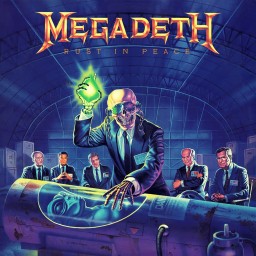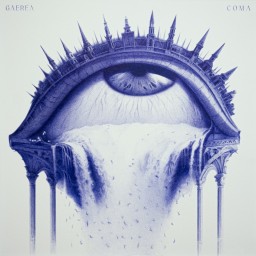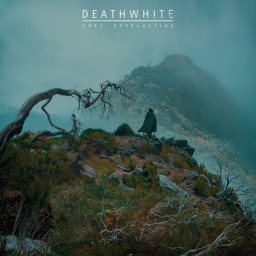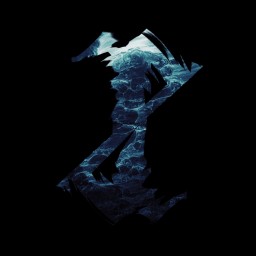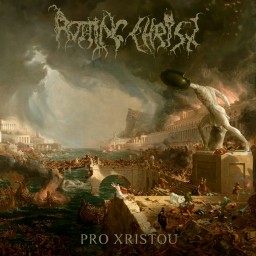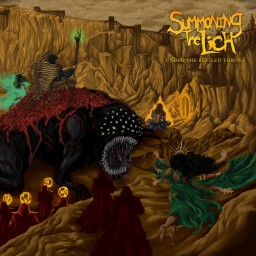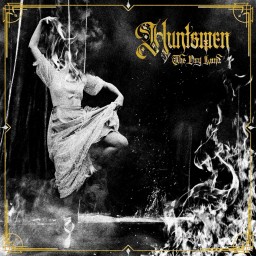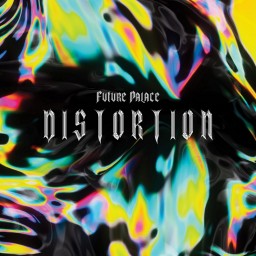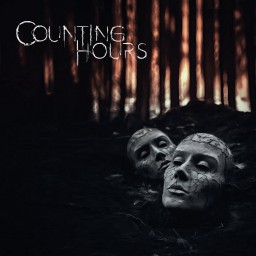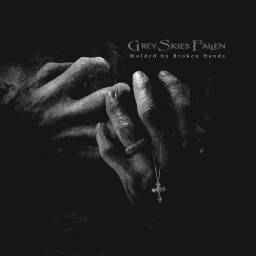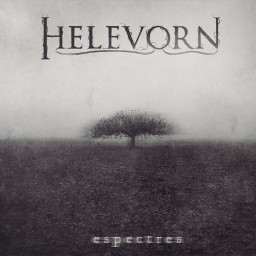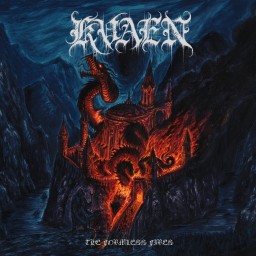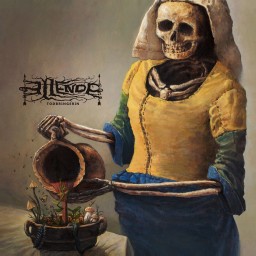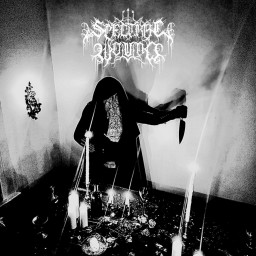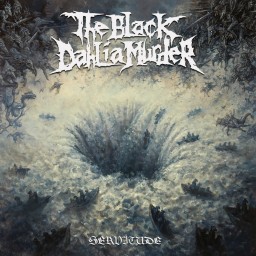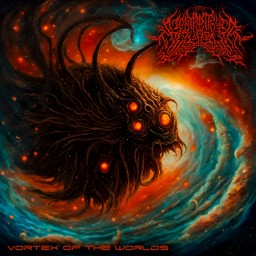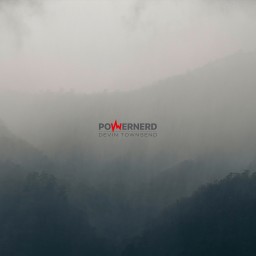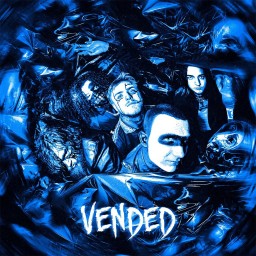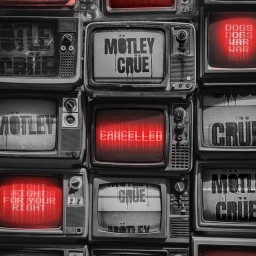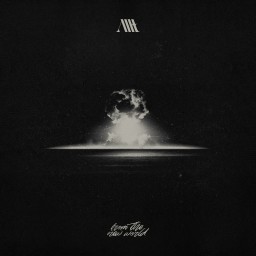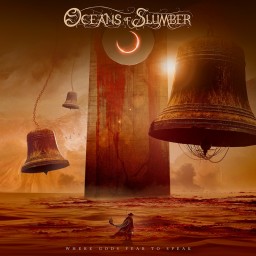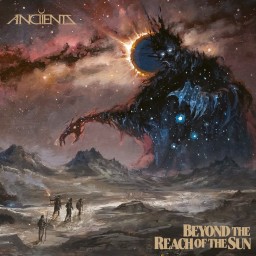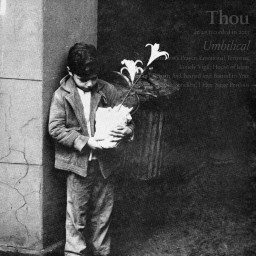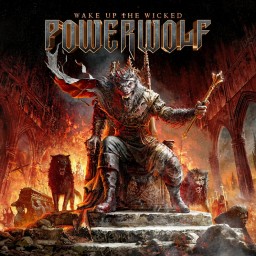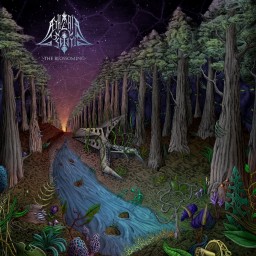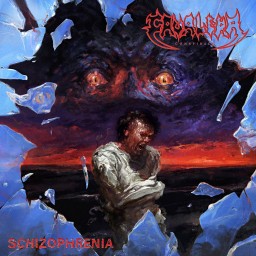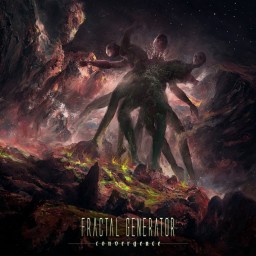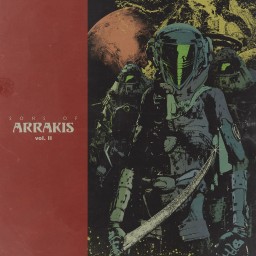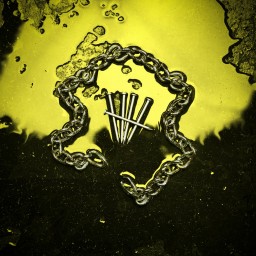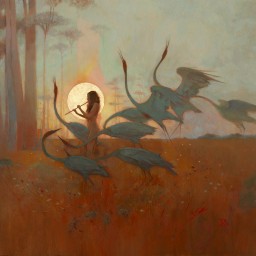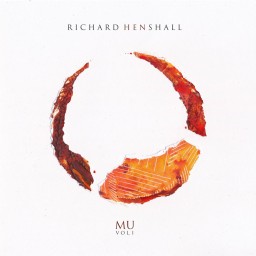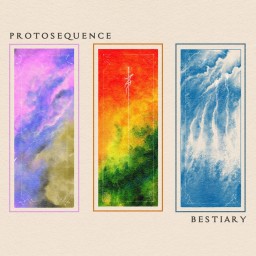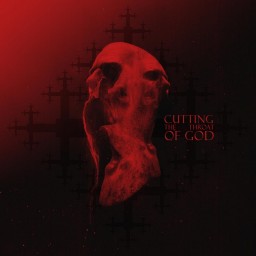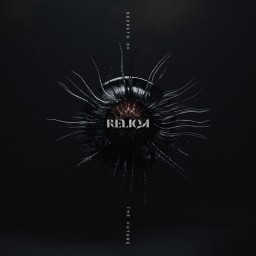Saxy S's Reviews
Before I started listening to music on a critical level, I begrudgingly enjoyed a couple of Megadeth's early records because all of my friends hated Metallica. I knew about Dave Mustaine's history with Metallica and, of course, the drastic style changes of thrash metal between the two bands. I think most people who enjoy the early Megadeth records (Killing is My Business through Rust in Peace) like how uptempo they are, the riffage and the solos. No one in their right mind is listening to a Megadeth record for the lyrical themes.
Now that I am older and have listened to a lot more music, I find Megadeth are just plain boring. When I listen to thrash in 2025, my go to classic names are Metallica, Testament, and Kreator, while bands like Slayer and Megadeth lose me every time. As for Rust in Peace in particular, I can provide credit where it is due, for a late 1980s thrash album, this is produced wonderfully (amendment: I am listening to the 2004 remix version of the album). Besides the messy guitar solos, every instrumental part is articulate and David Ellefson's bass lines are given a lot of presence to give the songs on this record huge momentum. And even though I've never really enjoyed Dave Mustaine's vocals, this early 19990s era of Megadeth, including albums like Rust in Peace and Countdown to Extinction are some of my favourite vocals timbre's of his.
But now we get to the juicy parts. I know my opinions on thrash metal are far from conventional, considering I have gone on record multiple times and said that Reign in Blood is the weakest of the big four 1980s thrash albums. Like with that album, Rust in Peace represents a tired trend in thrash that does not resonate with me. That trend being a complete disregard for writing memorable hooks and instead making a rif-fest and hoping for the good favour of the neoclassical fans with endless guitar solo wanking. I'm no pop apologist who thinks that guitar solos don't belong in music, but they have to be tasteful and Megadeth filling each song to the brim with blistering solos is the antithesis of tasteful.
The compositions are also very patchy. Both of the albums bookends "Holy Wars... The Punishment Due" and "Rust in Peace... Polaris" are divided into two distinct passages that do not belong together. I hated the constant increase of intensity on "Hangar 18" as well. The sequencing does stable out during the albums middle portion with "Take No Prisoners" and "Lucretia" having a decent form, strong groove and less intrusive soloing. And I cannot deny that the first half of "Rust in Peace... Polaris" is really great. But when it comes to sequencing, because Megadeth don't modulate any of their songs to different key centers, after a brief period of time, even the records more infectious riffs become a chore since we've already heard them earlier in the album. "Poison Was the Cure" borrows heavily from the first section of "Holy Wars... The Punishment Due" while the finale of "Rust In Peace... Polaris" sounds really cool, it can't help but but use a similar tempo and key as "Take No Prisoners".
I cannot state it enough times for risk of getting crucified that thrash is a hard sell for me. I don't hate the genre, but I am disappointed in what it has become. As thrash moved further and further away from its speed metal roots with Slayer's Show No Mercy, early Helloween and Venom, melody becomes an afterthought in the genre. And no thrash band of the 1980s suffers from this more than Megadeth. Metallica seemed to do just fine during their legendary run, which is likely why Mustaine left the group in the first place. Rust in Peace is an album that should have been put to bed a long time ago.
Best Songs: Take No Prisoners, Lucretia, Tornado of Souls
Genres: Thrash Metal
Format: Album
Year: 1990
Another 2024 catchup album and this one comes from the Portuguese black metal band Gaerea. Although calling Coma black metal might be of a false flag, since the album has more in common with the progressive side of death metal. At best, Coma might be one of those progressive death/black metal hybrid albums that are rare, but are becoming more common in circles I visit.
Nevertheless, Coma does have it strong suit moments. I really enjoy the production on this project; the dynamic shifts between the clean post-rock and the ferocious extreme metal passages is pulled off exceptionally well throughout the albums runtime. And despite the harsh vocals requiring some getting used to, I really enjoyed their texture. The vocals are pronounced (which is rare for black metal) and not over-compressed in a cavern of reverb.
Unfortunately, this is an album that suffers from diminishing returns the longer it goes on. When the album begins, it's good; an elongated post-rock opening before "The Poet's Ballet" opens up into the aforementioned death/black metal hybrid that will become commonplace through the rest of the record. "Hope Shatters" is great and "World Ablaze" has a cheeky post-hardcore feel to it and reminded me of a Svalbard tune in the best way possible. But after the title track, "Coma", the album seems to revert to a very familiar sound and doesn't feel engaging with the audience; songs become formulaic and become interchangeable with the others, the main melodic motifs in the vocals and guitar become less emphatic and more post-metal texture rather than something memorable. The experimentation of song progression through "The Poet's Ballet" and "Suspended" is forgotten as shorter, more intense tracks become the regular.
Coma is a record that has aspirations that are pulled off mostly well. True black/death metal crossovers are much less frequent than you may think, so hearing one that is as blatant as this makes it a decent jumping on point. Although the album does fall into familiarity after a while, it still does leave some echo of uniqueness to it.
Best Songs: Hope Shatters, World Ablaze, Unknown
Genres: Black Metal
Format: Album
Year: 2024
2024 may have been a really good year for me personally, but musically, the past year has been an enigma. I listened to a ton of new music in the alternative and progressive metal plains, including progressive death metal. As such, I found more than ever that metalcore was always being pushed forward to the top of my listening schedules. And while I doubt 2025 will be any different, my ventures into other genres of metal have become incredibly stale in recent years. So 2025 is going to be different; I am making an effort to explore more Fallen, Pit and North albums. These might not necessarily be new releases (such as today's album), but it would really help to boost up my review numbers in each of these clans. It will also serve as a great opportunity for me to declutter my back catalog!
2025 kicks off with Pittsburgh's Deathwhite. The bands 2022 album, Grey Everlasting, Deathwhite start showing signs that they are developing their own identity instead of just copying early Katatonia. It isn't a complete deviation from the sound, so fans of that 2000s gothic sound will surely find a place at home with this. But these compositions turn out to be rather forgettable. To their credit, Deathwhite does an adequate job of masking the lack of motivic development in their music through alternating sound palettes (i.e. acoustic versus electric guitar phrases). But the progressions of these songs run really flat as the vocals run monotonous, which is to be expected since the instrumentals don't modulate or grow that much at all. A key change or a modulation would have been great for the albums variety.
As for the production, I can't say that it was all for the best. Previous Deathwhite albums have many more faster passages to break up the doom-and-gloom gothic overtones. But on Grey Everlasting, they live up to that title by making that emotional reaction the mainstay. I think I heard only two blast beat grooves in the percussion on this entire forty-eight minute album, and those tracks turned into the albums highlights. Overall, this songwriting decision hurts the albums back half because it becomes very repetitive and songs like "Asunder" pay for it.
Perhaps the progressive nerd in me expected something else, even though the songwriting techniques are drastically different. I would guess that Katatonia fans will find this acceptable, especially since it is much closer to traditional doom metal than Katatonia. But I just found the album tired and frusturating.
Best Songs: Earthtomb, Quietly, Suddenly, Grey Everlasting, Formless
Genres: Doom Metal Gothic Metal
Format: Album
Year: 2022
Imminence return less than a year after The Black with what I would have assumed were the demos or B sides for that record. But, it turns out that this record is, in fact, the re-release and ten year anniversary of the bands debut record from 2014.
Unfortunately, The Reclamation of I takes two steps forward, then takes one step back. Imminence returned to form on this album when it came to writing infectious hooks and choruses. The way in which the band is able to gracefully pass melody between guitar and vocals is excellent. The choruses are also much more expressive than The Black and Heaven in Hiding.
Notice that I only mentioned the guitar and vocals when it came to melody. The big step back that this record contains is how little of the violin melody is incorporated. Given that this is the bands debut, I can accept that they wanted to stay true to the original article, but this would have been a amazing opportunity to make that record even better. I caught onto Imminence late, but I always thought of Imminence as being a simpler, more accessible version of Ne Obliviscaris; sonically at least. These two bands couldn't be anything else alike, since Imminence play very traditional melody/harmony metalcore, while Ne Oblivscaris are known for intricate contrapuntal performances. But now, with this neglection of this very crucial, and definitive part of the bands sound, Imminence would seem to have become just as formulaic and generic as any other modern metalcore band in 2024.
In short, the album is fine. The compositions are solid and the vocals are its true selling point. However, if you were expecting this as anything other than a by-the-book replaying of the bands 2014 debut album, you are going to be severely let down, as I was.
Best Songs: Proclaim, Salt of the Earth, Those Who Seek
Genres: Metalcore
Format: Album
Year: 2024
Times are not good for the Greek black metal outlet, Rotting Christ. After the bands change of style in the late 2010s began incorporating more symphonic elements into the music, many fans of the group stopped watching this band from a distance and began to turn away from them entirely. I, on the other hand, saw it as a nice change of pace for the group that felt like they were turning a new leaf on their career instead of staying the course with some pretty forgetful melodic black metal.
Unfortunately, Rotting Christ have not seemed to do anything with this sound beyond the initial attempt. I think that Pro Xristou has a diverse sound palette, but it sounds remarkably tedious and boring. The album is less black metal than ever before and much closer to a gothic doom metal, but Rotting Christ have only picked up on the most basic traits of that style of music. In short, Pro Xristou has no personality of its own. The vocals are performed even more dramatically artsy than even the last album, The Heretics as it transforms almost into ritualistic hymns. The melodic leads on this album are non-existent and it quickly turns into background noise after just a few tracks. This Christ has been fully composted.
Best Songs: La Lettera Del Diavolo, Pretty World, Pretty Dies
Genres: Black Metal Symphonic Metal
Format: Album
Year: 2024
From St. Louis, Summoning the Lich are making death metal for scene kids. Now that might sound like a humongous insult, but The Black Dahlia Murder have been around and always managed to stay hip with those hardcore kids. So it's only natural that someone would come along and double down on this audience.
Many other metal forums say that Summoning the Lich are just Black Dahlia Murder worship, but I'm not sure I get that impression from Under the Reviled Throne. There are a lot of fast moving, technical passages here; plenty of high intensity riffage, blast beats and alternating between death metal howls and deathcore screeching. What Summoning the Lich does well with this album is not making these songs just sound like technical wanking and have some well composed songs on display. They might not be the most memorable in hindsight, but in the moment they sound well composed with some detail given to melodic dominance. It almost gives me a hint of Allegaeon in its presentation, which I was certainly not expecting. The breakdowns are not as intimidating as the modern deathcore breakdown; they act more as momentary reprieve's before the heavier death metal returns, which is how breakdowns should be incorporated into death metal anyways.
Under the Reviled Throne is an album that shows a lot of promise on the outset, but in execution, the album seems to have run out of tricks in the bag about half way through. I was getting tired of the triplet feel transition on every song, I was getting frustrated that almost ever track followed the same structural format, and I really wasn't a fan of how Summoning the Lich disguised this lack of variety through key shifting. The bass lines are also severely lacking and makes the mix of this record feel less heavy as a result. It's a decent album with some good moments, but not worth the full runtime given how repetitive it becomes.
Best Songs: Reviled Crystal Wielders, The Carrion Fleet, The Void Gate
Genres: Metalcore
Format: Album
Year: 2024
From Chicago, Huntsmen's brand of sludgy post-metal can be interesting at times, but I feel like this band lets the more progressive compositional techniques get in the way of decent song structure more than they would like. While the band has some really good ideas on The Dry Land, it has a tendency to sound like these motifs haven't been fully realized before the tracks move into a completely new pattern, while leaving the first motif to rot. It leaves me with a bad first impression as "This, Our Gospel" is ruined by a floundering theme. The album does objectively get better as it progresses, but they still do peak through the poor songwriting throughout the record.
The biggest thing I think is the drastic dynamic sways on The Dry Land. Songs like "Lean Times" and "In Time, All Things" have solid crescendo's and work wonders for individual song pacing, but as a full album, the intensity of the percussion and chordal guitars, mixed with doom-y post-metal interludes creates a bit of a whiplash effect. Add to that a very hit-or-miss production where the bass is alarmingly absent for many of the records most important moments (i.e. the intro of "In Time, All Things") and we find ourselves feeling quite underwhelmed.
What we are left with is a band and album that shows plenty of potential; earworm/progressive songwriting, dual vocals, and phenomenal sense of dynamic control, while still being held back by some tired progressive trends, spotty production and meandering.
Best Songs: Cruelly Dawns, In Time, All Things, Rain
Genres: Post-Metal
Format: Album
Year: 2024
From Germany, I was surprised when I was going through my year end lists for 2024 and noticed that I had not reviewed the Future Palace album, Distortion. I found this very surprising because one of this albums promotion singles, "Malphas" did cross my desk last year and I figured that would be enough to at least have this record come to light. Better late than never I suppose.
However, I'm not sure that is a net positive for Future Palace since I've now spent half of the year with Reliqa and it leaves Distortion feeling hollow. If it isn't the production sounding super thin and tinny in the guitars, or the predictable song structures, it's the album structure slowing the album to a crawl by its conclusion. They are able to save it with "Amethyst," if only barely. I don't like how this album thinks it's more epic than it actually is. The inclusion of synth strings on a number of tracks (i.e. "The Echoes of Disparity" and "They Take What They Want") feel forced and unnecessary for an album whose main guitar contributions are wall of sound trance grooves. I do like the vocals from Maria Lessing and the variety that is on display here, as she alternates from warmer singing style to harsh metalcore belting. The rap vocals aren't bad per se, but compared to Monique Pym of Reliqa they act like they've been given forced intensity and it loses some grandeur. And I can admit that Future Palace do know how to write a good chorus once in a while. But once in a while doesn't cut it when the rest of the album is cookie cutter octanecore. Beyond a couple of early album singles, Future Palace turned out to be much more forgettable than I would have hoped.
Best Songs: Malphas, Dreamstate, Amethyst
Genres: Alternative Metal
Format: Album
Year: 2024
From Finland, Counting Hours are making some of the best gothic doom metal I've heard this decade. Each song on The Wishing Tomb has a superb atmosphere and melancholy. The vocals are very engaging and very memorable, and the harsh death vocals serve as accentuation instead of being the records focal point. Compositions manage to remain tuneful throughout the project as they modulate between the guitar and vocal leads. The Wishing Tomb does not meander either; this is still doom metal, but even then, Counting Hours keep songs concise and on topic, even the longer tunes like "The Wishing Tomb" and "This Well Of Failures." Production is pristine with a fruitful bass with its own independence from the power chords of the guitar. And the synths act as accents to an already solid foundation instead of overwhelming the entire mixing of the album. I know there isn't that much to say about The Wishing Tomb, but it encompasses nearly everything that I love about gothic doom metal and I can't believe it took me this long to hear it.
Best Songs: Timeless Ones, All That Blooms (Needs To Die), The Wishing Tomb, No Closure, This Well Of Failures
Genres: Doom Metal
Format: Album
Year: 2024
From New York, Grey Skies Fallen have been around for a while and have stayed relatively obsolete in the greater doom metal scene. But seeing a positive review from Sonny gave me confidence that a smaller act could make a dent in my Fallen year-end-list for 2024. So what did we end up getting with Molded by Broken Hands? Well, a lot actually.
Molded by Broken Hands is death doom, epic doom, gothic metal and perhaps a little funeral doom with its compositional techniques. Grey Skies Fallen have a wide soundscape in their music and makes this record oddly progressive in a way. And the album is very well put together all the same. Just listen to those wild tempo/style changes during the bridge of "No Place For Sorrow." Normally I wouldn't be the biggest fan of such wild changes (especially on a doom metal album), but despite the lack of preparation, their incessant nature makes them super endearing.
I won't lie, first impressions of this album were not great with the opener "A Twisted Place in Time" for the reasons that were mentioned previously. But as I already mentioned, Grey Skies Fallen have a way of making these seemingly unrelated phrases work together through songwriting and repetition. And through that songwriting, the album stays engaging up to its final notes. A few of the doom metal albums I've reviewed recently all have the same problem; where the record does not do nearly enough in the soundscapes/compositions and leaves the album staggering to its conclusion. Grey Skies Fallen, fade out ending withstanding, end Molded by Broken Hands with the same level of commitment to the work as they did at the start. "Knowing That You're There" has the same heart and soul as the opener because it hasn't been bogged down by seven similar sounding doom dirges previously.
The production can be a little shaky at times, but it's mostly good. I like how the synthesized strings are not present throughout the entire album and only appear occasionally for additional weight. The bass presence is felt tremendously helping the albums thematic arc. If anything, it's probably the harsh vocals that sound the most out of place. They aren't horrible, but they tend to sound too fry and hushed, while the booming, gothic cleans tower over the instrumental. At least the record has a decent mix of harsh-to-clean vocals so it isn't as upfront of an issue.
The albums ending on a slightly optimistic tone only exemplifies this albums variety and why I enjoy this album as much as I did. Grey Skies Fallen are making high quality doom metal under almost everyone's noses and yet no one bothers to stop and smell the roses.
Best Songs: Molded by Broken Hands, I Can Hear Your Voice, Cracks in Time, Knowing That You're There
Genres: Doom Metal
Format: Album
Year: 2024
From Spain, gothic doom metallers Helevorn's fifth studio album is decent, if a little formulaic. Everything that you could expect out of this kind of a record is here, with very little in the way of growth. The instrumentation stays standard with its guitars, bass and vocals most of the way, with only a handful of synthesizer passages for variety. Even the vocals have a lifeless, bass-y delivery like Type-O-Negative. I would not disparage anyone who stopped listening midway though.
I think Espectres' biggest issue is that the opening three songs all seem very predictable and all have similar traits. However, the album makes modest changes to the formula during the second half and reignite my interest. The fact that it takes that long to get going is the real issue here however. So structure takes what may have been a okay album, into one that feels even more forgettable.
Best Songs: The Defiant God, Unbreakable Silence, The Lost Futures
Genres: Doom Metal Gothic Metal
Format: Album
Year: 2024
From Colorado, The Flight of Sleipnir's brand of doom metal is listed on RateYourMusic as "Pagan Black Metal." Does it have melodic leads in the guitar constructed by tremolo picking patterns? Yep. Does it contain the patented harsh, shrieking vocals? Absolutely, although not as frequent as previous records. But that alone does not make Nature's Cadence a black metal album. Just because it borrows from a band like Panopticon when incorporating dark folk/country techniques, does not make it black metal by comparison.
The music itself though is brilliant. I am a big fan of the country interludes on "Madness" and how they help that song change themes before building the song back up in intensity. Of course those themes are closely related so it never feels like the band has just shoehorned two separate ideas together. In addition, the album flows very well between each track; never leaving the impression that these songs weren't meant to be played collectively. Even "The Woodsman," which can barely be classified as metal, is a great track because of how well it is prepared by its predecessors.
That being said, even though the albums structure is superb, I can't really stay engaged with it because just as it starts getting good, the album ends. I think a lot of this has to do with the ten-plus minute "North" to open the album. It almost gives me the impression that the band were planning on giving "North" all of their love, while the remaining four songs were just to fill out the runtime, when that really did not need to be the case. Songs on this album are warm and lively; they don't need to be bogged down by almost twelve minutes of droning.
Nature's Cadence is a solid piece of doom metal that should be right up my alley with its folk-y roots and pristine production. But the album seems to contain too many small things and not enough time to rectify them. Maybe I'm just too pessimistic and this album will grow on me with more listens.
Best Songs: Madness, The Woodsman, Wanderer
Genres: Doom Metal
Format: Album
Year: 2024
In a futile attempt to clean up my metal listening in 2024, December (and likely into January) is the month I will be bolstering the more extreme clans here at Metal Academy that I frequent the least (i.e. Fallen, Horde and North), so there are going to be a lot of short little blurbs about a handful of records I heard in 2024. Hopefully, I'll be able to do something a little bit more timely come 2025.
From Sweden, Kvaen is a one man melodic black metal project with pagan tendencies. This is the third album and the first to be released under publishers Metal Blade. Being one of heavy metal's most prominent record labels left me cause for some concern at first, and then I heard "Tornets sång" and it all made sense.
Sure, this might be a black metal album at its core, but you cannot listen to "Tornets sång" and tell me it does not sound like In Flames. I think that song in particular brings to light many of this records technical deficiencies. When the album has the black metal aesthetic on singles like "The Formless Fires" and "The Ancient Gods," the record sounds fantastic. When Kvaen starts to delve too heavy into those In Flames-esque melodic death tendencies, the guitar becomes too intrusive in the mix and become far too centric.
What may come as a surprise to newcomers is the thrash/speed callbacks on "Traverse the Nether" and "Basilisk" as they did with me. I know that these genres form the basis for the original black metal sounds, and I think the intensity is warranted and well executed, but on they can feel a little too spaced out as part of a full listen. Even then, calling The Formless Fires spaced out is a great misrepresentation of the album since most of the songs here feel cut short or missing a final chorus or something. Most of the album consists of fadeout endings on "The Wings of Death" and "The Formless Fires," but they never feel like they've reached the end of their statement. It makes an album that is already quite short feel even shorter.
Within The Formless Fires is a decent framework of a melodic black metal album. Good variety, strong melodic form and a mostly decent production. Compositionally, this album is desperately lacking; give a couple of these songs one final refrain and you have an excellent release. As it is, The Formless Fires has potential, but just like a fire, it loses its form after all the firewood has burnt up.
Best Songs: Traverse the Nether, The Ancient Gods, Basilisk
Genres: Black Metal
Format: Album
Year: 2024
In a futile attempt to clean up my metal listening in 2024, December (and likely into January) is the month I will be bolstering the more extreme clans here at Metal Academy that I frequent the least (i.e. Fallen, Horde and North), so there are going to be a lot of short little blurbs about a handful of records I heard in 2024. Hopefully, I'll be able to do something a little bit more timely come 2025.
From Germany, the fifth release from the atmospheric blackgaze group Ellende starts off broodingly slow and melancholic through the intro in order to prepare the listener for the depressive state of the rest of the music. When the black metal instrumentation enters on "Ballade Auf Den Tod," you can feel the hauntingly sad beauty behind this dance. And that emotion comes through in the production which is full in its scope; a fully functioning bass line to give this album some weight in its lower half. Songwriting is kind of lackluster, but for this style of black metal, where texture rules the day, the repetitive, droning nature of the tremolo guitar leads allows for these emotions to remain stagnant, which I assume was the bands intention.
Unfortunately for Ellende, I feel like they have this emotional technique down a little too well. With the depressive lyrical themes and tempos that only seem to get progressively slower as the album continues, Todbringerin is dangerously close to transforming into a doom metal album. This album would certainly benefit from having more tracks like "Verachtung" in the middle of the tracklisting to compliment the brooding of "Scherben" and "Versprochen..." And perhaps this is a personal anecdote, but I'm listening to this album on the first major snowfall of the season, which comes with its own emotional weight, so perhaps a record this emotional was not the best choice for a end-of-the-year cleanup.
Anyways, if doom metal is up your alley, but you wish it could have more tremolo picking guitars and shrieking black metal vocals, then you'll likely find a home inside the cold embrace of Todbringerin. Otherwise, I can tell that this is a good album, but something about it just doesn't sit right with me.
Best Songs: Ballade Auf Den Tod, Scherben Teil I, Verachtung, Am Ende Stribst Du Allein
Genres: Black Metal
Format: Album
Year: 2024
In a futile attempt to clean up my metal listening in 2024, December (and likely into January) is the month I will be bolstering the more extreme clans here at Metal Academy that I frequent the least (i.e. Fallen, Horde and North), so there are going to be a lot of short little blurbs about a handful of records I heard in 2024. Hopefully, I'll be able to do something a little bit more timely come 2025.
From the budding Montreal black metal scene, Spectral Wound return following 2021's A Diabolical Thirst with another audible assault of classically influenced black metal. Songs of Blood and Mire hits you right out of the gate with a cacophony of sound from the blast beat percussion, tremolo guitars, an actual bass line, and barely audible screeching vocals. And in this case, it actually works to Spectral Wound's benefit since it directs most of melodic focus on the guitar, which does sound quite fruitful in its presentation, execution and development. The punk aesthetic that shows up on "At Wine-Dark Midnight in the Mouldering Halls" is a stylistic choice for the band and leaves the listener with a different style of intensity than experienced before. What's more is that these punk grooves do appear sporadically throughout the rest of the album for some nice reprieve. "Aristocratic Suicidal Black Metal" is the, relatively speaking, cooler song on the album where melody reigns supreme and rage takes a backseat. It likely would have been a better track if it had been saved maybe a song or two later.
I will say that Songs of Blood and Mire is a better record than A Diabolical Thirst and that will likely be enough for most. However, like with the last album, I found the record to get a little stale during its second half as many of the variations to the sound became less prominent as the record dipped back into a very comfortable melodic black metal approach. The first four track of the album are worth the price of admission alone, but the record goes on for too long with not enough variety to warrant the extended runtime.
Best Songs: Fevers and Suffering, At Wine-Dark Midnight in the Mouldering Halls, Aristocratic Suicidal Black Metal, A Coin Upon the Tongue
Genres: Black Metal
Format: Album
Year: 2024
Amazing to think that this album even exists considering how important former vocalist Trevor Strnad was to the Black Dahlia Murder's songwriting process. However, that is not to say that the rest of band were not able to capture Trevor's essence inside Servitude and release a very solid album. This album still feels very comfortable in the melodic death metal ways, but the band isn't afraid to step outside of that steamy comfort and pull the string back for some slower, pummeling riffage on "Mammoth's Hand." The new vocal styling's of Brian Eschbach have a familiarity to them, while still sounding providing some original personality to the band in Trevor's stead. I wouldn't go so far as to call it essential listening since it is still the Black Dahlia Murder and finding variety in their music (and melodic death metal in general) can be a losing game. Compared to albums like Nocturnal and Ritual, even with a new vocalist, Servitude feels like status quo Black Dahlia Murder. Not that this is a bad thing; this band are still making quality, meat-and-potatoes melodic death metal in 2024 and I'm still giving this as good of a recommendation as I can. Think of this band's discography as comparable to Lamb of God; nothing new or innovative, but a top quality refinement of a niche.
Best Songs: Cursed Creator, Evening Ephemeral, Transcosmic Blueprint, Utopia Black
Genres: Death Metal
Format: Album
Year: 2024
This is undoubtedly Poppy's most consistent album since leaving the world of pop behind. A large portion of that must come from how the album feels like a large culmination of sounds of the past; the songwriting of Poppy Computer, the heaviness of I Disagree, and the cleaner sounding metal production of Flux. Negative Spaces also has the distinction of having a handful of synth heavy tracks interspersed throughout the tracks. To go along with the calmer interludes tracks, they pair well and help with building the album up instead of feeling like an all out romp. Poppy's vocals are without a doubt, the albums biggest fault as her screams are... lacking to put it lightly. I think that the variety of timbre on this album however saves the vocals from becoming grating as they do on an album by say... Knocked Loose. I'm not expecting many to appreciate this sound the way I do, but as a full album experience, this space is more positive than expected.
Best Songs: They're All Around Us, Vital, Crystallized, The Center's Falling Out, New Way Out
Genres: Alternative Metal
Format: Album
Year: 2024
The second full length album from Ukrainian black metal outfit, Labyrinthus Stellarum, is one of these projects that shows a lot of potential anchored by a unique sound. Vortex of the Worlds is the kind of pleasant sounding black metal album that traditionalists might scowl at. It reminds me of a more concise version of a Mare Cognitum album with great soundscapes and a keen ear for melodic storytelling. It does remind me in a way of the tendencies of bands like Burzum and Summoning with its synthesized tones and interludes rather than the relentless impulses of Vorga. But these sounds have been modernized and now carry with them a vastness of reverberation that sound gorgeous behind the vocals, and the wall of sound compositions. The one true weakness found within is the structure of the album; while I won't deny that "Transcendence" and "Downfall" are both pleasant sounding tracks, the real jewel's of Vortex of the Worlds are found in its second half, with "From the Nothingness" and "Vortex of the Worlds" being the obvious standouts with how wonderful the melodies are. Luckily, you won't have to wait very long for those songs since this albums runtime is almost criminally short. If the albums structure was more balanced (even without the inclusion of one additional track), this could have been one of 2024's best albums. But as it stands, it is still really great and would be a great addition to those craving another atmo-black band with dungeon synth incorporation.
Best Songs: Transcendence, From the Nothingness, The Light of Dying Worlds, Vortex of the Worlds
Genres: Black Metal
Format: Album
Year: 2024
It seems like the longer VOLA sticks around in the progressive metal sphere, the further away from their identity they get. Now this comes with its own sets of residual effects, but for progressive metal, it can sometimes turn into a net positive. But VOLA were never one of these bands that threw away the concept of melody, harmony and motivic development in their music for the sake of elongated song structures, with face melting guitar solos.
And, wouldn't you know it, the newest VOLA album, Friend of a Phantom, will likely not have the same gradual effect as the band may have intended. If anything, there are more similarities between this and Soen's 2023 record Memorial, as the truly progressive aspects of the songwriting are gone. Now, VOLA sits as a singles band with the occasional djent breakdown to quell the crowd. And that might surprise you, since the first track, "Cannibal" is one of the heaviest that VOLA have ever made. Thanks in large part to the harsh vocals of In Flames' Anders Friden, you would be forgiven thinking that "Cannibal" was going to be an accurate representation of Friend of a Phantom, but that could not be further from the case.
The grimier sound quality continues into "Break My Lying Tongue", but it kneecapped by a distracting synth lead that is persistent throughout the songs choruses. But following that, this album goes into the status quo of VOLA alternative metal. And the hooks are not even as good as an album such as Witness to back it up. It has good moments sure (i.e. "We Will Not Disband" and "Hollow Kid") but they seem more spaced out than ever before.
At least the production is solid. This record has a great sound to it; all of the records most important parts are given center stage during their respective tracks. Whether that be the dogshit synth on "Break My Lying Tongue," or the vocoder harmonies of "Glass Mannequin." Even the albums djent-ier breakdowns are presented with polish and precision and also contain a semblance of motivic growth through them. The structure of the album however is not a strong suit. The album starts heavy, but becomes progressively slower and mellow as it persists and leaves me feeling like it runs too long for its own sake.
I will admit, Friend of a Phantom left me feeling underwhelmed. I'm not quite sure what I expected from VOLA with this album given their track record, but this felt lazy and uninspired. It almost feels like they want out of the progressive metal sphere and would rather take a place in the spotlight as an above average alternative metalcore band. The result however is losing a piece of what made VOLA so popular in progressive forums in the first place. The individual songs might be decent, but it's hard to separate them from the full artwork.
Best Songs: We Will Not Disband, Bleed Out, Hollow Kid
Genres: Alternative Metal Progressive Metal
Format: Album
Year: 2024
It takes Better Lovers just fifteen minutes to bring the rush of memories back to Every Time I Die's popular brand of southern metalcore. And the result is something that sounds really cool, but I feel like it could have done a little bit more.
Part of this is how similar this EP sounds to the aforementioned band and the inclusion of Greg Puciato on vocals does not change much. Perhaps I was kind of expecting a little bit of a pivot that would differentiate Better Lovers from Every Time I Die, but perhaps it was also a compositional decision in order to quickly bring in old fans who could easily pick out that sound and style.
As for the compositions themselves, they aren't too bad. "Become So Small" and "30 Under 13" certainly have some wallop to them, while the cleaner "Sacrificial Participant" and title track have a nice alternative feel and show off the bands melodic side. The instrumentals are punchy and gritty, while Greg's vocals are decent as well, but likely at their worst on the opener "Sacrificial Participant", if only for their lack of dynamic growth.
Overall this is a decent debut EP for Better Lovers that, once again, will fill in the missing hole in your heart left by Dillinger Escape Plan and Every Time I Die. However if this band wants to be more than a simple nostalgia act, they need to modernize and improve the formula in some way or another, otherwise this animal will go extinct before its had a chance to reproduce.
Best Songs: 30 Under 13, Become So Small, God Made Me an Animal
Genres: Metalcore
Format: EP
Year: 2023
I can say with utmost certainty that Every Time I Die was not apart of my go-to metalcore bands during the 2000s. I never disliked them, but in comparison to the festival metalcore that was popular late in the decade and even into the 2010s, they never crossed my mind. That said, I was surprised by the “mainstream” pivot with records such as Ex Lives and Low Teens late into their career, with some of Low Teens still serving as regular playlist fodder for me.
When ETID (Every Time I Die) broke up, it left a noticeable hole in the metalcore scene, since their brand of southern metal was one-of-a-kind. And it became a huge deal when three of ETID’s members were heard in studio with ex Dillinger Escape Plan vocalist, Gerg Puciato. And thus, Better Lovers came to be. The bands debut EP (God Made Me an Animal) was a wallop of southern metalcore that was certainly fun, but also felt too like the other band.
Highly Irresponsible by contrast is a record that has the distinct sound of ETID, but with a little extra flavour. The album is grimy and lacks polish, but the instrumentals have a bit more flare than one might expect from a classic ETID album. It should be all the makings of a disaster record, yet somehow the southern rock influence remains constant throughout. Highly Irresponsible sounds ferocious.
Greg Puciato might have something to do with that. The vocal delivery of Puciato is very different from Keith Buckley. And if I’m being completely honest, Puciato’s vocals fit the intensity and style better than Buckley. These vocals are distinct and lack the clean polish that were present on previous Dillinger records. But the vocals are not perfect; I do not remember Puciato’s clean singing being this hit-or-miss, however some of the cleaner songs like “A White Horse Covered in Blood” have this eerily out-of-tune vocal presentation that does not sit well with me.
The compositions are varied, which is nice, but lack consistency. You can hear sporadic mathcore influence from Dillinger Escape Plan, some straightforward bangers from classic ETID, as well as the more melodic side of that band that was present on Low Teens. Some songs are catchy, like “Future Myopia”, but other like “Superman Died Paralyzed” just scream album filler. Meanwhile, the ending is odd. “At All Times” has the classic sound of resolution on a metalcore album, only for “Love as an Act of Rebellion” to show up and rip the band-aid off for one more assault; it felt like a classic bonus track on a physical album, but without the secret.
This record might turn out to be a grower for me. While I do like Better Lovers for their blending of styles from their previous endeavours, it almost feels like too much of a good thing. Highly Irresponsible shows the love for Every Time I Die and that these mates still have plenty left in the tank to offer us. However, in doing so, Better Lovers created an album that is missing polish. I am willing to let it slide for now, but it would be irresponsible of me to give them the benefit of the doubt in the future.
Best Songs: Your Misplaced Self, Future Myopia, Deliver Us From Life, Love as an Act of Rebellion
Genres: Metalcore
Format: Album
Year: 2024
I've come to expect nothing from a new Devin Townsend album. Devin's discography is eclectic from industrial, avant-garde, alternative, country and even broadway musical. So I entered PowerNerd completely blind, which was the right call. And my impressions of it are good, if not a little disappointed. The more accessible stylings of the instrumentation and compositions are solid enough, but lack focus during the albums middle. Melodic development has always been a calling card of Devy and PowerNered is no exception. Instrumentals can be quite dull as the wall of sound production leaves portions without vocals or melodic instrument flat. And the album is bookended in a dumbfounded way. "Ruby Quaker" might be my favourite metal song of the year and no I am not sorry, and "Falling Apart" is great as well, but why are they the first and last songs of the album? Where was this melodic punch through the remaining ten tracks?
Perhaps it is the persona behind the act, but I expected a little bit more from PowerNerd. There are great moments at this albums beginning and conclusion, but not a lot else in the middle. Maybe Townsend just wanted to play it cool for an album, which is why this sounds so much closer to Addicted than anything else. And I think that is fine for him, but I could use a lot more of that punchy songwriting that I know Devy is capable of.
Best Songs: Ruby Quaker, Falling Apart, Gratitude, Younger Lover, Glacier
Genres: Alternative Metal
Format: Album
Year: 2024
I watch a lot of baseball in my spare time. And I always find it unusual when a rookie gets the call who is the son of a former major leaguer. In that moment I can feel the wrinkles on my forehead becoming more dense as it means my youth is getting further away from me. It's even weirder when that father was a really good player; perhaps even a hall of famer. How can your son possibly live up to the enormous standards that you set nearly twenty years ago?
Vended is the musical equivalent of this. Founded by Griffin Taylor, this nu metal act has the insurmountable task of bringing nu metal to a new generation...while also having familial ties to one of its greatest figures: Corey Taylor.
And yes, just like those sons of major leaguers, Griffin Taylor does have many mannerisms that are very similar to his father. Vended sounds like if you combined the aggressive, misanthropic lyricism of early Slipknot and merged it together with the heavier groove aspects of a band like Lamb of God, with just a tiny sprinkling of death metal techniques as well. The percussion of this album is closer to that of later Slipknot records like All Hope Is Gone and We Are Not Your Kind, with a more poppier sound instead of sounding like trash (literally).
Besides these deviations, you already know what to expect once you hear about the relationship between Griffin and Corey Taylor. The album has some solid hooks, but they feel disjointed from one another with plenty of filler. The instrumentals are performed/produced well and the vocals are very indebted to Corey, but they also have some death metal grit that even early Slipknot records could not replicate. The albums short runtime is a bonus, but it still feels like a lack of development is taking place, and is not helped at all by a final three tracks that feel like fragmentary ideas.
A lot of my criticisms can boil down simply to "if you like Slipknot, you'll like this." And as someone who has made their criticisms of Slipknot well known in the past, it should not surprise anyone that this really isn't my cup of tea. I can hear interjections within Vended's music that make me believe that they could have a profitable future, but they first need to step out of the shadow of their idols before that can happen.
Best Songs: Am I The Only One, Nihilism, Serenity
Genres: Alternative Metal
Format: Album
Year: 2024
Hey kids, do you like the 1980s? Do you want to go back?
Most people will likely not even give this new Motley Crue EP a chance because of its title. Cancelled: most will assume that it is a shitty attempt at being edgy and controversial, but in all likelihood, is just a drawn out project where the protagonist calls himself a "bad man" for an uncomfortable amount of time. And, having listened to it I can tell you that this assertion is not entirely the case.
Their are basically only two songs here (three if you count the "Fight for Your Right" cover), but they really do not sound that bad. They sound right out of the 1980s with albums like Shout at the Devil and Dr. Feelgood. The issue comes through in the compositions as neither of these two tracks sound like they were given the same love for their choruses as "Kickstart My Heart" once was. "Dogs of War" is fun albeit generic, while "Cancelled" may well as not have had a hook at all.
Which brings us back, once again, to the lyrics. Now, I avoid tabloids like Loudwire and Metalsucks like the plague. They (like many others) have been revealed to be corrupt shills who jerk each other off and promote "their boys," regardless of quality, while talented, independent musicians get shafted. If an attempt to get Motley Crue cancelled was orchestrated, why should Motley Crue care? Wouldn't "their boys" help them out? Or maybe they are terrified of what might happen next?
Motley Crue should not be in hot water for something that was not considered taboo during their prime. But perhaps they should be in hot water from their bath at the retirement home.
I hate when any project is announced as "the finale" and everyone gives their passionate goodbyes, only for that projects corpse to be lifted out of the coffin like its still 1989. This reunion of Motley Crue is just that and Cancelled represents everything that is wrong with remake culture. And, like with Velma, Motley Crue will inevitably be cancelled after just one season as well.
Best Song: Dogs of War
Genres: Alternative Metal
Format: EP
Year: 2024
It appears to me that the metalcore kids are beginning to take control over a sizeable portion of the progressive metal community. The kicker is that they don't call it "metalcore" so as to draw the unimpressed Eyre of the progressive metal snob. Instead they call it "Djent" with a silent "D" to prove their sophistication. Allt are a generally new band out of Sweden who made strides throughout the early 2020s and released From the New World just the past week as their first full length LP. And let me just say: nothing about From the New World is remotely prog. It contains thall tuned guitars, atomic drop breakdowns, glitchy production and the occasionally catchy vocal hook. And yet I still really enjoyed it.
I know this album is not without its faults. The production can become excruciatingly frail at times; when guitars are tuned this low with this much feedback, it only makes sense that their would be some peaking in the mix. In addition, the overall texture of this album does cause some of the vocal lines to become condensed and resorted to backgrounds. But even with all of that, From the New World is actually very concise, has more than its fair share of catchy grooves and licks, and the production issues are more sporadic than I might have made them sound earlier; it's probably a better produced record than the recent albums from Humanity's Last Breath or Currents.
Best Songs: Remnant, Echoes, Emanate, Ephemeral
Genres: Metalcore Progressive Metal
Format: Album
Year: 2024
Oceans of Slumber have transformed into the metal band who have exhumed the most wasted potential of the 2020s so far. I never thought of them as being a bad ensemble, but a debut album in 2013 that showed promise has fallen on deaf ears since 2018's The Banished Heart. Two follow up releases that improved barely anything and continuing further into 2024 with Where Gods Fear to Speak.
This album is all over the place in its texture/style. I'm not opposed to bands altering their sound to adapt another genre, like how Oceans of Slumber isolate their melodic death roots in favour of doom/gothic metal here, but the execution of these sounds in harmony sounds more like a trainwreck. As a result, the album feels remarkably disjointed; none of these smaller ideas were given any semblance of connectivity and progression throughout the runtime. the record will non-chalant transform from a slow, melodically pleasant doom section into black metal blast beats and death metal howls at the snap of a finger without any preparation. And this, sadly, is further explored in Cammie Gilbert's vocals as well. There are a lot of metal bands that are perfectly fine writing music without harsh vocals (i.e. Katatonia, Within Temptation, late Opeth), but Oceans of Slumber still imagine heavy music not truly being "heavy" without it. So vocal lines become disjointed with a hybrid vocal delivery, which when paired with the poor songwriting, makes the vocals feel even more obtuse.
I thought a lot about the band Epica while listening to Where Gods Fear to Speak and all of the places that Oceans of Slumber should have focused on to make this record better than it is. Unfortunately, many of the best elements of those Epica albums like Omega and The Quantum Enigma is painfully absent here. What we are left with is a band trying to replicate one of the 2010s most consistent power/symphonic metal bands, but adding the worst possible aspects of progressive metal songwriting to the table for an overall lackluster experience. Oceans of Slumber are the modern day victims of this commonplace issue within the genre, but will likely get a free pass because of the progressive metal tag. It's really a shame and leaves this review feeling empty.
Best Songs: Wish, Wicked Game, I Will Break the Pride of Your Will
Genres: Progressive Metal
Format: Album
Year: 2024
Anciients are a band that were very popular among the more djent-y side of prog and metalcore during the 2010s and I could never get into them at the time. Just about a full decade later, Anciients release Beyond the Reach of the Sun, their third studio album and it shows a lot of growth as well as future potential.
First thing I noticed was how different of a sound scape this is. Instead of the djent and metalcore of previous albums, Anciients have gone closer to melodic death metal, and more specifically, mid 2000s Opeth melo-death. That should be enough of a seller for most on its own, but in the interest of specifics, compositions have a knack for bending dynamics and making crescendos that sound rewarding. Kenny Cook has a very nice vocal range and still employs some of his signature death metal screams as before, but now in reserve as the clean singing is not only impactful, but memorable.
I was a little hesitant on the albums length going into it, but the more I listened to Beyond the Reach of the Sun, the less bloated it became. The album has some longer moments (i.e. "Forbidden Sanctuary" and "Melt the Crown") but the songs are well constructed and compliment each other remarkably well. There is enough variety in the sound structure that it never feels bloated, but not too vast in its scope that it starts becoming overzealous.
If you like your mid 2000s Opeth mixed with some Mastodon or The Ocean sludge, this is a great return for Anciients and an excellent place to catch on. I hope that they continue down this path in their future projects.
Best Songs: Forbidden Sanctuary, Melt The Crown, Cloak Of The Bast And Black, Beyond Our Minds, In The Absence Of Wisdom
Genres: Progressive Metal
Format: Album
Year: 2024
I'm not sure who Ronnie Radke hates more on Popular Monster, you, the listener, or himself.
Now, I have made it no surprise through my track record that my tolerance for modern metalcore is thin. This is not to say that there cannot be some gems in this cesspool, but more often then not, they are utterly disposable and interchangeable. As a result, I am completely and utterly indifferent to Ronnie Radke. I found the music in both Escape the Fate and Falling in Reverse to be milquetoast and beyond boring. This trend carries into Popular Monster as it does not appear to have an original bone in its body.
When the album started, "Prequel" had this gradual swell in the instrumentals and Radke's rapping vocals, which then explode into the albums metal breakdown. But it didn't take me very long to start making comparisons to Hardy's Quit!! from just last month. And that album wasn't very original either. Calling on Jelly Roll to perform guest vocals on "All My Life" was just the ultimate sign of incompetence; "This album is nothing like Hardy," so then why did you even bother adding a country singer for one of your promotional singles you dipshit?
The production on the album is certainly not doing FiR (Falling in Reverse) any favors. Metal music published through Epitaph records have always had a severe hit-or-miss quality to them, but this is the furthest thing from good. Most recently, it has been bands like Architects that have taken the heavy brunt of these production gaffes, and FiR take it to a new level; drum peaking, guitar mush, and disgusting synth lines. That just leaves Radke...who is probably the most impactful part of this album. The vocals are delivered with authority and gravitas and speaks bluntly through his lyrics.
Which is about as generous as I can be with lyrics this vapid. Y'know what this album is about? I'll let ya guess....if you said "anti-woke gibberish, cancel culture and gun wielding America", congratulations! You don't have to listen to Popular Monster (your ears will thank you). I know there won't be many who agree with me on this, but when you have a song called "Trigger Warning," maybe include some content that's actually triggering rather than just saying "I'm a bad man" for the eighteenth time. It's all performative and it looks embarrassing. If Radke was looking to win new fans with Popular Monster, he failed spectacularly.
Popular Monster is an album made for people who believe Radke has done nothing wrong; that all of his legal issues were conspiratorial and everyone trying to cancel him are just mad that he is an asshole. And at this point, you don't really need to cancel Ronnie Radke or Falling in Reverse. They will do it all by themselves.
Best Songs: Watch The World Burn
Genres: Alternative Metal
Format: Album
Year: 2024
Many of you will know that my palette in relation to doom metal is quite niche. I'm not super into the droning, unchanging albums that simply wallow away in a single tone for an hour runtime. I much prefer the more melodic side of the genre that is shown in death doom. And yet somehow I find sludge metal to be far more entertaining. It's usually far heavier from a sonic perspective and borrows from Pit clan genres like thrash and groove metal, which I know I'm been vocal about the past five years.
Thou is a band that I was never familiar with until Umbilical was requested for reviewing purposes. They have an extensive discography that dates back almost two decades and have a similar release formula to Full of Hell as they bring in collaborators such as The Body, Mizmor and Ragana. And with Umbilical, you can tell that Thou are playing to a very specific type of sludge metal; one that might take some getting used to for the more traditionalist doom/sludge fan, but that helps it in the long run.
There is a good share of metalcore influence on Umbilical. The riffage is precise and the unison bridge's carry a lot of this records drive and momentum. And the riffs, while nothing super innovative or ear catching, songs like "I Feel Nothing When You Cry," "The Promise" and especially "Panic Stricken, I Flee" feel like fully developed songs. I was super impressed by this albums longer tracks "Narcissist's Prayer" and "House of Ideas," which are very cohesive and tell a full story throughout the runtime. Some of the albums early, shorter tracks feel as if they were missing something from the piece; almost like they needed one final chorus to bring everything back together.
Production is very solid. For as sludgy as an album Umbilical can be, it lives up to that title with some heavy, dank guitar tones and a cavernous low end. The percussion is robust, but never feels like it is overtaking the guitar or vocals as the main attention seeker. The vocals are harsh and delivered with a "sludgy" pretense which matches beautifully with the instrumentals, but something about them being so shredded and pushed back in the mix just does not feel right to me in this style of music. I understand the album has lyrical themes of isolation and grief, which is a nice touch of detail, but it can make things harder to digest.
While I did praise the album for its condensed runtime earlier, I do have concerns with the lack of diversity in the soundscape. Yes, it's doom/sludge metal. It's hateful, aggressive, loathing, but nowhere within Umbilical does Thou give its listeners an opportunity to mentally recover from the cacophony of sound. This band is incredibly lucky that Umbilical is produced well because I'm not sure if I could have tolerated this meshy timbre with a less than pristine mix. I do really like this album and Thou did an excellent job of taking influence from other bands outside of their genre to create something that is uniquely theirs, but also indebted to the past.
Best Songs: Narcissist's Prayer, House of Ideas, I Feel Nothing When You Cry, The Promise
Genres: Sludge Metal
Format: Album
Year: 2024
Powerwolf are back with their seventh studio album in seven years and they are ready to power metal your face off until you cannot power your power metal anymore. This new album has so much great power going on it that it's honestly impossible to keep up with all the power. With new standards like "Power Metal Song #1" and "Power Metal Song #3," this record will be the most power metal album you hear in all of the year Power-Twenty-Power.
Okay, joking aside, I don' think that Wake Up the Wicked is that bad. The production is tight, the band still have some solid melodic leads on "We Don't Wanna Be No Saints" and "Kyrie Kiltorem," and the record clocks in at a brisk thirty-seven minutes; the song lengths do not overstay their welcome and feel like fully fleshed out ideas, and the album as a whole is high octane energy that never feels like it needs an interlude.
In the grand scheme of things however, Powerwolf are getting on my nerves when it comes to new releases. As mentioned previously, over the past seven years, Powerwolf have released a new album on an annual basis and there has not been any attempts to deviate from their established formula in that time. For as much as I despise modern Alestrom albums, at least they don't assault you with the same, drawn out pirate/folk metal at this rapid of a pace.
I wanted Interludium to be a turning point for the band; a metaphorical interlude that would lead into a second act that was more introspective and thought provoking. It didn't have to be progressive or conceptual like the most recent albums by Angra or Unleash the Archers, but something...unique. I can get a kick out of Wake Up the Wicked for sure, but I'll have a really hard time remembering any of this by years end.
Best Songs: Kyrie Kiltorem, Joan of Arc, Thunderpriest
Genres: Power Metal
Format: Album
Year: 2024
Discovery is a wonderful thing. Ætheria Conscientia are a black metal band that I have seen pop in to my recommended feed (if only briefly) back in 2021 for Corrupted Pillars of Vanity and became a group that I would keep tabs on, even if I found the music to be far too patchy. And this came along solely based on the name of the group. Like with Ne Obliviscaris over ten years ago, Ætheria Conscientia was a name that would be impossible to forget and would be in eager anticipation of their next move.
Now this is coming from the assumption that their foundational progressive/avant-garde metal roots would result in growth and development of a very unique atmospheric black metal sound. And with The Blossoming, I can see the huge strides taking place from the inside to create a more streamlined, accessible, and overall more enjoyable album.
Corrupted Pillars of Vanity is a daunting listen with just five tracks, but a runtime that approaches one hour. The Blossoming by comparison is six tracks and runs at a relatively brisk forty-five minutes. While that might seem like a minor issue, what stands out is that Ætheria Conscientia never sound like they are still performing after all the concert goers have left. Each song (most notably the longer tracks like "Astral Choir" and "Endless Cycle") are cohesive and tell a fully developed story through the instrumentals and lyrical themes. I enjoy how this band is able to sound as dense as they do, while still caring for the listeners time and money; it's a record that gives its listeners all of its necessary information and then lets you decide what it all means, all while not rambling.
And that's important because the compositions are carrying a lot of weight. For a black metal album, The Blossoming is pretty light when it comes to traditional black metal motifs. Tremolo picking guitars are frequently substituted for open power chords, percussion rarely sticks to a rhythmic blast beat foundation, and the vocals are extremely varied in their delivery. And that's even before you add the clean guest vocals of Lisieux on this albums bookend tracks and the ALWAYS sultry saxophone leads that regularly appear throughout the project. This horn in particular is performed with a very similar timbre as those found on Rivers of Nihil's Where Owls Know My Name, which just so happened to be one of the only consistently good pieces of that record!
For a record that is as progressive/avant-garde as The Blossoming sounds, it's quite a shame that it did not axe out many of the black metal production tropes, such as a lackluster bass line, and filtered down vocals. The bass lines are inexcusable at this point; while the guitars are quite pleasant and the open power chords give The Blossoming a sense of wideness, it would me more beneficial for the bass to be closer to the front and allow for the guitars a little bit more breathing room to be experimental instead of playing foundations. As for the vocals, I don't think that hiding the vocalist in the back of the room like this was the most viable solution. After all, The Blossoming is not you're run-of-the-mill black metal album in its lyrical content and themes. This space opera is very surreal and could use a more present narrator to show the listener its folklore and mythology.
Ætheria Conscientia reinvented themselves on The Blossoming and they succeeded in many different ways. Besides the obvious, this record has a feeling of humanity in it that has not been felt in a lot of extreme metal recently. It pulls from Ihsahn, Rivers of Nihil, and Kayo Dot in its ambitiousness and pulls of the best in all of them. Best of all, the record never feels like its meandering or runs out of things to say before its conclusion. I kind of expected the album to end a bit more emphatically, but I think that's part of its appeal and avant-garde texture.
Best Songs: Haesperadh, Daimu Kadasdra Ko Antall, Endless Cycle
Genres: Black Metal Progressive Metal
Format: Album
Year: 2024
It will probably not come as a surprise, but Sepultura were never among the "elite" thrash bands when I was making my way through the classic discography of the genre. I never thought that they were a bad group, but the heavier, almost death metal take on thrash metal was still a very niche point in my young years. But when the band moved away from the more traditional thrash sound to something more groovy on Chaos A.D. I could not help but be intrigued and I have found a new found appreciation for this band and their early output in recent years.
A lot of that has to do with Cavalera. The re-recordings of Sepultura's first two releases, Bestial Devastation and Morbid Visions, was such a good idea since it took the two most underutilized Sepultura albums, gave them a modern facelift, while some crazy people even replaced their Sepultura recordings with the Cavelera ones! And so, I was perplexed as to why Schizophrenia was getting the modern touch up, since Schizophrenia is generally considered as the first great record that carried on through Chaos A.D. But whatever, here it is: Schizophrenia is a solid piece of nostalgia farming. It's hard to critique the music itself since all of these songs are over thirty years old at this point.
So what's new here? Well the production first and foremost. It has some real grit and feels intense, coalesced by the percussion of Igor Cavalera. They can be overwhelming at times, most notably in the flat footedness of the bass drum, but their intensity is impeccable and carries over to the crunchy guitars, which are open and have much more room than their original recording counterparts. I would have liked to hear a little bit more emphasis on the bass, but for this type of double guitar thrash, I can't say that I'm surprised. I still don't like it since the instrumentals feel one note in their execution.
That just leaves the vocals and for what they are worth, they give a sense of "modern nostalgia." Early reviews like to criticize Schizophrenia for its liberal use of reverb, but I don't think it's as bad as those reviewers make it out to be. Early thrash metal vocals are notorious for having excessive reverb (Slayer's Show No Mercy, Metallica's Ride The Lightning, Testament's The Legacy), and in the modern day where death metal is so prim and proper with pin point execution of cut offs and unison technical proficiency, the laid back nature of the vocals is refreshing.
It leaves this review feeling a little light on content, but that is what happens when a band re-records their old material. Nothing here is new beyond bringing a classic album into the modern age of thrash metal. I still like it, but as mentioned earlier, I don't think that this album needed a modern facelift. To be honest, I'm a little bit worried if Cavalera continue in this vein in the future with albums like Beneath the Remains and Chaos A.D. coming into view. I can't see fans, or myself, taking those seriously.
Best Songs: From the Past Comes the Storms, Escape to the Void, Septic Schizo, R.I.P (Rest in Pain)
Genres: Thrash Metal
Format: Album
Year: 2024
I don't have a lot to say about this release from Sudbury's Fractal Generator unfortunately, but I still feel obligated to write something about Convergence because they are homegrown and I am making a genuine effort to present Canadian content not only as a point of exposure, but also as a point of contention in hopes that someone will see this and add some variation to improve. Or if I'm lucky, maybe the band will see this one day!
Convergence is a pretty solid, if not unoriginal, death meta album. The album has a lot of intensity carried out by way of some crunchy harmonic dissonance. The record can be hard to follow at times given how much the album fluctuates between modulating time signatures and riffs, but many of them do link back to other motifs. The occasional chorus lines that appear on "Cryogenain," "Cyphertext" and "Algorithmic Pathways" give the album a feeling of otherworldliness, before blast beats and howls plummet that idea back into the earth. Beyond those however, this is pretty standard death metal. Even though Fractal Generator do have some nice dynamic shifts throughout this record, it still stands that it can become a little overwhelming at times.
That being said, Convergence is not a bad album. It should satisfy the more tech death-y audience, and its runtime will make sure that the listener does not become too drained by the end. But its simplicity in the compositions does make this record sound like its missing something to turn it grand. Like I said during my Ulcerate review, the proficiency of Cutting the Throat of God is so good that other records just don't cut it for me. This is a prime example of that.
Best Songs: Cryogenain, Ancient Civilizations, Ciphertext
Genres: Death Metal
Format: Album
Year: 2024
Do you like traditional doom metal? Do you like the modern revitalization of the genre with bands like Spirit Adrift? Well then its time to take you Ibuprofen and check out this new record from Sons of Arrakis!
I honestly do not have a lot to say about Volume II because if you've heard any of the stoner/doom revival bands of the 2010/20s, then you already know what to expect out of this, just of a lower quality. The mixing on Volume II is very solid and does not meander. Song lengths are concise and trim out all of the excess fat that runs through a large chunk of doom metal, and the instrumentals are performed with relative proficiency, with a special shout out to the vocal stylings as well. That said, the compositions are inconsistent, as some songs like "Metamorphosis" sound really intense, while others like "Beyond the Screen of Illusion" fall super flat. Beyond that, the sound palette is very pedestrian and can be easily misheard as another doom/stoner band.
It is not a bad record by any stretch, but Sons of Arrakis should do some serious soul searching in order to stand out from the crowd, otherwise they will be easily forgotten about amongst the Crypt Sermon's and Neptunian Maximalism's of the world
Best Songs: High Handed Enemy, Metamorphosis, Blood for Blood
Genres: Stoner Metal
Format: Album
Year: 2024
We have once again returned to the world of late 2010s metalcore bands that I have no association with. My ties with melodic metalcore were severed around 2008-09 when deathcore started to become super popular and began to dominate the Warped Tour scene. I found myself drifting further away from that clique as I continued to dig myself into more progressive music, as well as building my foundations of jazz music. So, Wage War were a band that completely passed me by during the 2010s. Their debut, Blueprints, was generally favoured I guess, but I couldn’t tell you anything about that album or any of the subsequent releases by the band.
And despite the quality of the music found within STIGMA, I can give Wage War credit for not releasing the same barebones, meat-and-potatoes metalcore album again. This album has some artistic growth on it, most notably in its industrial and synthetic elements. STIGMA does not maintain a static format throughout the entire runtime, and I can give credit where it is due.
Unfortunately, that is where the credit to Wage War ends because wow is this album generic. Modern metalcore gets a bad reputation for being painfully generic and uninspired and I can only imagine the critics saying that were staring directly at Wage War while they said it. STIGMA commits the cardinal sin of making every breakdown sound like it was composed on an AI bot with its painful buildup, always plateauing on the same tired callout by the vocals, before transitioning into a clearly chopped up metalcore breakdown. I hear more variety on a lofi hip hop collaboration!
The sequencing is even worse. Wage War are clearly tired of the same old stuff, which is why they added industrial elements into this album. But song transitions do not work well at all. It is almost an issue of STIGMA trying to do way too much. “MAGNETIC” is okay, but how do you pair it with “NAIL5?” It is such a baffling change of style and direction that somehow made “MAGNETIC” less enjoyable. And then it happens again at the end of the record, with “HAPPY HUNTING” into “HELLBENT.”
And then there is the mixing. First and foremost, the guitars sound tinny and sharp, rendering much of the power required for these breakdowns to work mute. And the cacophony of sound during the albums sung choruses is mind numbing. How can one listen to the hodgepodge of noise on “IN MY BLOOD,” notice that the vocals are being swamped, and say “yeah this sounds good, print it?”
The fall of modern metalcore is quite a shame, but not surprising if you examine it for more than thirty minutes (almost the amount of time it takes you to listen to this whole album). I wish that more modern acts would look back towards the early 2000s or beyond and really learn what it takes to write a good hook. Because where we are at this moment, STIGMA by Wage War is a breakdown album with the occasional verse interlude. If not this, then at least try something a little bit more off the rails. I mean, Reliqa released an album this year that is basically progressive nu metal. I recommend sticking with that.
Best Songs: TOMBSTONE, HELLBENT
Genres: Alternative Metal
Format: Album
Year: 2024
Heavy metal fans deserve to be happy once in a while. We love to entrench ourselves in a sea of anger through intensity and loud noises, all the while an instrumental palette of minor harmonies and piercing dissonance rings through our ears. How hard is it for metal artists to use major keys and slightly more uplifting themes? Since the arrival of blackgaze around the late 2000s, we have seen this begin to take shape. One of my biggest appraisals of Deafheaven's Sunbather was how that album began; presenting a false sense of security and joy, even if the title track was anchored by a relentless percussion and howling black metal shrieks. Alcest have done much the same with Écailles de lune and Spiritual Instinct and I thought for sure that this would be the peak of "happy metal".
And while Les chants de l’aurore will continue in this style to mostly positive results, I would be lying if I said I enjoyed this as much as their previous output. Something about this record feels...too carefree and I don't know where that comes from. The tempos and grooves on Les chants de l’aurore are far less driving than ever before, giving a feeling of stagnation. This album does not truly evolve that much from its initial presentation on "Komorebi" and the remaining songs don't do very much to justify their extended runtimes. Not only that, but the instrumental textures behind Neige's vocals feel more muddy and condensed than on Alcest's previous/best records.
I think many people will give Les chants de l’aurore a free pass because of how beautiful it is. Overall the texture is still very nice and a sound that you have come to expect out of an Alcest project. Neige is embracing even more of his clean vocals than even Spiritual Instinct as the harsh black metal shrieks become more textured window dressing. But a lot like with Knocked Loose earlier this year, if you're gonna give a listener just one texture for an entire record, it can become quite stale the longer that project chugs along. Les chants de l’aurore is not a long record, which should be in its favour, but two shorter interlude tracks ("Réminiscence" and "L’adieu"), the remaining five tracks do not perform nearly as well to carry this record to the stars.
Best Songs: L'Envol, Flamme Jumelle, L'Enfant de la Lune (月の子)
Genres: Black Metal Post-Metal
Format: Album
Year: 2024
This brief little EP from Haken guitarist Richard Henshall is a very impressive piece. The compositions here are well done and do not feel hindered by the lack of a vocal lead. Melodies are robust and compliment the djent-y jazz grooves remarkably well. I cannot force myself to rate this any higher though because of the intrinsic nature of this kind of progressive, instrumental music. Sure, Richard Henshall is a competent performer and the compositions are of a high caliber, but it is still instrumental progressive metal. So you can expect to hear a fair share of instrumental wankery and just as much elitism from its fans. Still, if it was not an EP, I'd probably rank it lower so take this side project for what it is.
Best Songs: Granular, Mu, Land Aliens
Genres: Progressive Metal
Format: EP
Year: 2024
Technical Deathcore eh? Well that's a genre that I don't see very often. Although a lot of deathcore bands use very technical/brutal death metal trends during their composition cycle as interludes between breakdowns, so this combination is not that uncommon.
Bestiary by Protosequence is an album trying to be about three artists at once. The first is (perhaps the most obvious one) Between the Buried and Me. The rapid style changes on individual songs are reminiscent of early BTBAM (Between the Buried and Me) albums such as The Silent Circus and Alaska. The issue here is that Protosequence are not super committed to the riffs as much of it falls into sounding very similar very quickly. The short passages of reprieve that the album gives you during the intro of "The Caveat" feel more like obligatory rests, which I do appreciate, but provide no value to the remaining material throughout the rest of the song.
The second and third acts Bestiary are replicating are Job For a Cowboy and Imperial Triumphant. Let's start with Imperial Triumphant, because this is in the production. Something about the instrumental timbre of this record just screams Alphaville just without the avant-garde instrumentation and it generally serves the album well when it comes to making the heavy sections sound heavy. The Job for a Cowboy comparison is more in the songwriting itself. These tunes are not as complicated as BTBAM, but their structure is quite similar to an early JFAC (Job for a Cowboy) release; specifically the "Entombment of a Machine" one. The vocals are furious in their delivery and show off a wide range of vocal capability, including pig squeals and gutturals, and the instrumentals can go from relentless death metal riffage to stank face breakdowns without warning. This is not really a style that I relate to very much at all since my attention span continues to get smaller every passing day, and the implication of "riff salad" leaves it half baked and missing that one connecting branch to lock it all together.
Two of these three comparisons look kind of familiar don't you think? BTBAM and JFAC both used to play a very technical, unfiltered kind of death metal, but both have moved on to greener pastures. Bestiary sounds like a record that wants to be placed firmly in the year 2005. That was twenty years ago. Come up with your own ideas.
Best Songs: Sam, The Caveat, Twelve Ropes
Genres: Death Metal Metalcore
Format: Album
Year: 2024
Five years ago, I was quite impervious when it came to technical death metal. My tolerance for the genre was very thin and I never felt like I could get anywhere with discovering the genre as an outsider. So when Ulcerate came along with their album, State Into Death and Be Still and showed me a new perspective on the genre, I was surprised. Turns out that technical death metal does not consist of just Cyptopsy, Nile, and Dying Fetus. One of the downsides however, is now that my palette of tech-death is where it is now, it becomes even harder to like those pedestrian tech-death bands because the bar was set so high five years ago!
If there was ever a band that could accurately describe their music without playing it, it would be Ulcerate. The bands sophomore album, Everything Is Fire, is a concise descriptor of the music found within. It's the hauntingly gorgeous beauty of staring out over a burning forest; nothing will be left except for burnt ash and rubble, while the wildlife of the forest are all left homeless with no protection from the elements, but you cannot help but stare dumbfound into its destruction. Suffice to say that Cutting the Throat of God was one of my most anticipated records of 2024. Did Ulcerate make the cut?
Cutting the Throat of God is objectively a great album. I really enjoy the texture of the guitars and the pulsating drive they have. Ulcerate do not employ the traditional chugging patterns of other technical death metal bands and instead use open power chords and atmospheric melodic motifs. Percussion is relentless as is expected and while it can feel like too much at times, I never feel like the percussion is overbearing, or overtly technical for its own sake. The vocals are adequate enough; I haven't really spent much time with the lyrics themselves yet, but if they're only half as destructive as Stare Into Death and Be Still, they will be more than adequate for their performance and execution here. And while the bass is not immediately prominent, the record does have a lot of promise with its low end, doubled by the open chordal guitars.
Perhaps my biggest issue with Cutting the Throat of God is in the compositions. The album generally has a great flow to it and Ulcerate are well aware to give their listener breaks to relax between the intensity with these lovely post-metal interludes. But I feel like the record has too many of them? It's almost like they took my biggest criticism from Knocked Loose's album You Won't Go Before You're Supposed To and overcorrected. They can feel, especially later on in the record (i.e. "To See Death Just Once" and "Undying as an Apparition"), like a formality rather than a connecting link to the next loud, death metal passage. And so it was a pleasant surprise when the closing track, "Cutting the Throat of God" did not have these interlude sections.
Cutting the Throat of God is by no means a bad album. Ulcerate are making some of the most interesting technical death metal of the last ten years. It is somehow both a cataclysm of sound and also very melodic and thoughtful. Despite the density, every note feels meaningful and the performances are articulate. The runtime can feel a little bloated, but I think that's just in the nature of Ulcerate at this point. But maybe that's just what I want out my technical death metal.
Best Songs: The Dawn is Hollow, Further Opening the Wounds, To See Death Just Once, Cutting the Throat of God
Genres: Death Metal
Format: Album
Year: 2024
Perhaps starting this review with the phrase "nu metal" might give a bad first impression. I've mentioned in other reviews of nu metal albums that I have a churning feeling in my stomach whenever I think about the edgelord gloop that was popular during my adolescence. But it was music that was substantial in refining my music tastes and what I did (and didn't) like about heavy music. And every so often, a new band comes along trying to recapture some of that nostalgic, early 2000s sound and I always prepare for the worst.
Reliqa are one of those rare breed of nu metal bands that don't sound incredibly dated or cringe. I adore Monique Pym's vocal timbre on Secrets of the Future from her powerful cleans and excellent chorus development and growth. And the rapping shows a lot of potential as well; Reliqa are not filling this album to the brim with Fred Durst or Mike Shinoda type rap vocals, instead they appear occasionally, almost serving as a pre-breakdown buildup where the a capella callout before the drop can be executed with authority.
The compositions on Secrets of the Future are really well done. I sometimes use the term "progressive pop" to refer to music like this, even though these two identifiers are not typically matched together. There is a style change during the bridge of "Killstar (The Cold World)" that is pulled off with the sort of technical precision that you would expect out of a Dream Theater album, but it effortlessly connects the outer two sections of this track without feeling like two completely different songs.
Production wise, this album overall sounds a little too heavy, as if it was a casualty of the loudness war of the late 2000s. But this has become a modern trend in metalcore in recent years so I find it hard to blame Reliqa specifically, but that does not mean I have to like it! If the record was a little bit more compressed in the instrumentals, it could have allowed for these quieter sections with electronic percussion and synthesizers to sound more ethereal instead of acting more as an interlude before the next howling chorus.
I had a hard time believing that my progressive friend group would have found Reliqa to be such an interesting and upcoming metal band, but one listen to this album's promotional singles and having sat with Secrets of the Future for a couple of weeks now it all makes sense. This is fancy stuff; it has that feeling of nostalgia for early 2000s nu metal without sounding like it came out of the 2000s, and Reliqa know how to write catchy pop metal without having them sound soulless. If they could find better producers for any follow up material, it would be safe to say that the future of Reliqa should be no secret to the wider heavy metal community.
Best Songs: Cave, Killstar (The Cold World), Sariah, Physical, Upside Down
Genres: Alternative Metal Progressive Metal
Format: Album
Year: 2024










